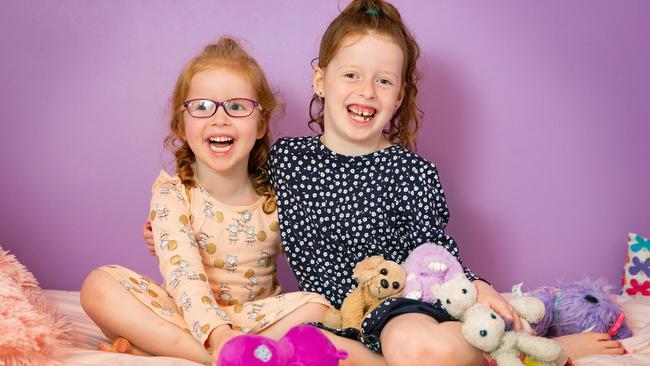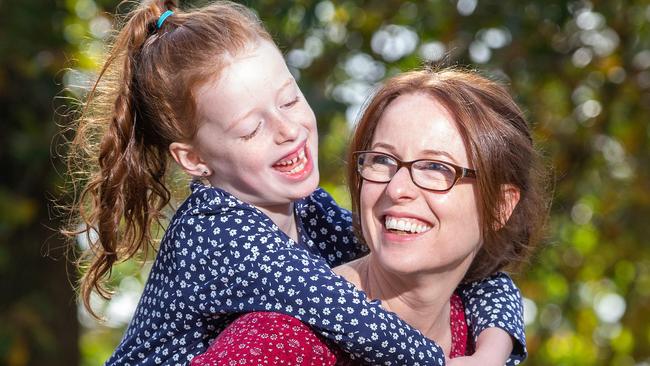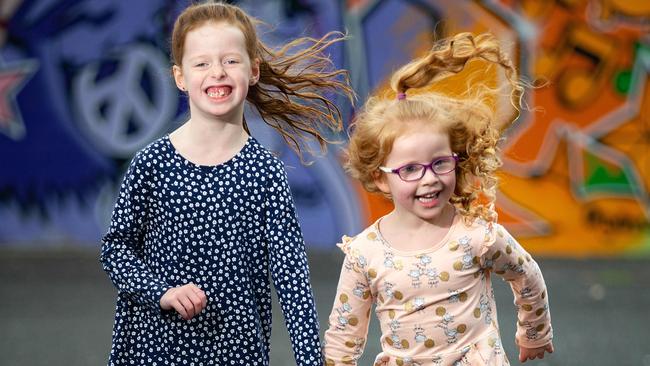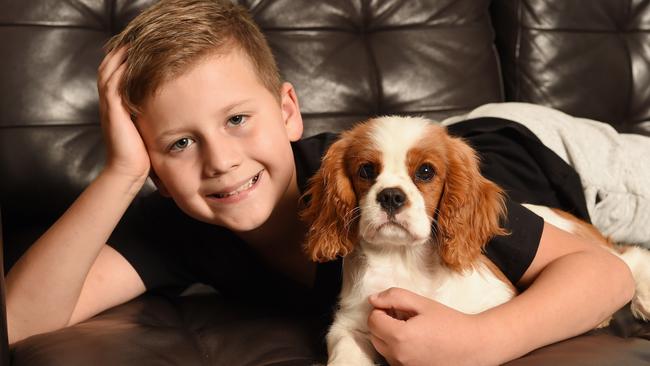Anxiety epidemic has Australian kids in its grip
An anxiety epidemic is gripping Australian children, creating a generation of kids too scared to go to school, who are not sleeping, are harming their bodies and are socially withdrawn. But there is a solution.
News
Don't miss out on the headlines from News . Followed categories will be added to My News.
An anxiety epidemic is gripping Australian children who are affected by daily worries, phobias and fears. They are too scared to go to school, not sleeping, harming their bodies and withdrawing from social situations.
Murdoch Children’s Research Institute research reveals the number of anxious children seeing doctors have nearly doubled over five years.
There is also an increase in the number of those children being prescribed medication to help deal with their condition.
Dr Margie Danchin audited paediatricians across the country about anxiety presentations to their practices. She found that most of the children being diagnosed were boys aged about 10.
READ MORE:
HOW TO TELL IF YOUR CHILD HAS ANXIETY
HOW STUDENTS SHOULD MANAGE STRESS
THE 5 BEST APPS TO DEAL WITH ANXIETY

Dr Danchin said lack of sleep, excessive screen time, bullying and overscheduling of school and extra-curricular activities could be behind the spike in cases.
Teachers and parents were also getting better at spotting the problem.
The good news for parents is the research says more than half of children with diagnosed anxiety have a mild case, and benefit from behaviour therapy.
“Early and accurate diagnosis and timely access to services for anxiety disorders — including psychological services — ensure the best outcome for children and adolescents,” she said.
Psychologist Kirrilie Smout, director of Developing Minds, said anxiety was the second most common presentation to her practice.
Ms Smout treats 250 children a week and said a quarter “didn’t meet the threshold for a clinical diagnosis but were anxious in daily life”.
“They continually seek reassurance, constantly question when things are happening, avoid things that make them worried and often have physical symptoms such as tummy aches, headaches and feeling panicky,” she said.
Ms Smout said parents should be optimistic but realistic about being able to help anxious kids.

“Some 60 to 70 per cent of children who are treated have significant and long-term improvements, although there are some children who go on to have persistent anxiety,” she said.
A new book, Anxious Kids: How children can turn anxiety into resilience, reports that half a million children in Australia have a clinical anxiety disorder — equal to about two pupils in every classroom.
Authors Michael Grose and Dr Jodi Richardson said parents should be reassured anxiety was manageable.
“Anxious kids aren’t broken and don’t need fixing. They need understanding, love, empathy, support and sometimes professional help,” Mr Grose said.
“Understanding that anxiety is a well understood and manageable condition brings anxious kids such relief. No family is immune. It seems one person talking openly about anxiety helps others feel comfortable enough to do the same.”
The book says the impact on families can be “disruptive to the point of exasperation and exhaustion”.
Dr Richardson said anxiety “impacted on children’s functioning and ability to take part in daily life”.

“Anxiety has the potential to stand in the way of kids being kids and their ability to enjoy the quintessential elements of a happy, relaxed, carefree, playful childhood,” Dr Richardson said.
She said telling anxious kids “not to worry” was not the answer.
“If you are wondering if your child could be anxious, see your GP and get professional input,” she said.
Mum of two Lauren Casey says instilling confidence early in kids is the best way to prevent future anxieties.
She enrolled seven-year-old Grace into the Trinity Kids program which aims to help children with issues such as anxiety, depression and bullying.
The program teaches Grace how to both identify and deal with schoolyard bullying. Ms Casey says she hopes this will provide lifelong lessons.
“The world is different these days, there is so much anxiety experienced by kids, and social media only makes it harder,” she said.
“The program teaches her what to do if there’s a bully, and offers tools to help her with any problems.”
Ms Casey says that with the growing pressure on kids, they need to be taught how to handle an array of situations.
Grace loves playing with her friends, going to school.

HOW JACK TACKLED HIS ANXIETY
Jack Lawson is a happy, loving boy who loves tennis, jumping on the trampoline and playing with his dogs Frankie and Miley.
However, things haven’t always been as easy for the Parkdale eight-year-old.
A quiet, shy child, Jack (pictured right with Frankie) started playing up when his family moved back to Melbourne from Hong Kong in 2015.
“He had lots of night terrors and would wake up screaming and crying,” his mother Christy Ditchburn, 43, said.
“He wouldn’t want to go to kinder and we’d have to almost drag him there. He would be perfect when he got there but when he picked him up he’d start kicking and screaming again.”
Jack didn’t want to eat or go to social events and spent his mother’s 40th birthday party “hiding under the bed,” she said.
“It was exhausting and awful to see him so distressed.”
The family GP referred him to Dr Margie Danchin at the Murdoch Children’s Research Institute, who diagnosed separation anxiety, anxiety, obsessive compulsive disorder and a sensory processing issue.
“We set new guidelines, boundaries and routines such as a strict bedtime. We also cut out artificial colours and flavours,” Ms Ditchburn said.
“We realised all the changes — a new country, a new house, a new kinder and me starting a new job — was a lot for Jack to handle.
“Jack is now absolutely divine. He’s always been a kind and caring boy but he is now less anxious and much happier.”
The arrival of two dogs in the household also helped calm Jack.
“He’s now in grade three and is doing really well, although we are always mindful about his wellbeing.”


